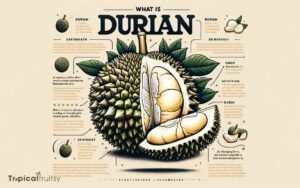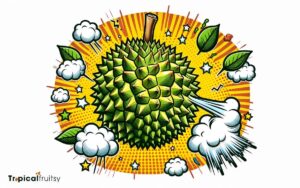Side Effects of Eating Durian: Unveiling the Impact!
Eating durian, the ‘king of fruits,’ can bring about several side effects due to its high fiber content, significant calorie count, and unique chemical makeup.
These side effects can range from mild digestive issues to serious health complications, especially when consumed with alcohol.
Durian’s rich nutrient profile brings both benefits and potential side effects, including:
Understanding durian’s side effects ensures safer consumption of this nutritionally dense fruit.

Key Takeaway
Potential Side Effects of Consuming Durian Fruit
| Side Effect | Description | Consideration |
|---|---|---|
| Digestive Discomfort | Bloating, gas due to high fiber content. | Eat in moderation. |
| Blood Sugar Fluctuation | High glycemic index can cause spikes in blood sugar. | Diabetics should exercise caution. |
| Allergic Reactions | Skin rashes, respiratory symptoms in rare cases. | Be aware of personal allergies. |
| Alcohol Interaction | May inhibit alcohol metabolism, increasing toxicity. | Avoid consuming with alcohol. |
| Strong Odor | Persistent breath and body odors due to the fruit’s smell. | Consider social implications. |
Digestive Discomfort Issues

Why might some individuals experience digestive discomfort after consuming durian, despite its popularity as a tropical fruit?
Durian contains a high amount of dietary fiber, which, while beneficial for bowel health, can lead to bloating, gas, or constipation in sensitive individuals or when consumed in large quantities.
Moreover, durian’s rich content of fructose, a natural sugar that can cause malabsorption issues in some people, may lead to symptoms like abdominal pain and diarrhea.
The presence of sulfur compounds, which give durian its distinctive odor, might also contribute to gastrointestinal upset in certain individuals.
Consequently, while durian is nutritious, providing vitamins, minerals, and antioxidants, its specific composition may challenge digestive processes, leading to discomfort for some consumers.
Unusual Blood Sugar Spikes

Consumption of durian may also impact glycemic control, leading to unexpected blood sugar spikes in some individuals.
The fruit’s high carbohydrate content, particularly its natural sugars, can elevate blood glucose levels, posing a risk for those with insulin resistance or diabetes.
Factors influencing blood sugar response: – Individual metabolic variations – The presence of other macronutrients consumed with the durian
An evidence-based nutritional analysis suggests that while durian contains beneficial nutrients, its glycemic impact should be monitored. The fruit’s fiber content may mitigate some effects, but the overall glycemic load is significant.
Moderation and contextual dietary assessment are advised for those monitoring their blood sugar levels.
Understanding this risk is crucial before indulging in durian, as the subsequent section will delve into potential allergic reactions.
Potential Allergic Reactions

While durian is celebrated for its unique taste and nutritional benefits, some individuals may experience allergic reactions upon consumption.
Symptoms can range from mild itching to severe anaphylaxis, highlighting the importance of recognizing and understanding the manifestations of such allergies.
Research indicates that the prevalence of durian allergy is not well-documented, but it is crucial to consider potential cross-reactivity with other known allergens.
Allergy Symptoms Manifestation
Individuals with a sensitivity to durian may experience a range of allergic reactions, from mild skin irritations to severe anaphylactic responses.
The manifestation of these symptoms can vary significantly among individuals, and understanding the potential allergic reactions is crucial for those who include durian in their diet.
Common Allergic Symptoms:
Mild Reactions:
- Itchy skin or hives
- Swelling of lips, face, or eyes
Severe Reactions:
- Difficulty breathing
- Rapid drop in blood pressure
These symptoms should be taken seriously as they can escalate quickly. Nutritional analysis reveals that proteins found in durian may trigger these immune responses.
Individuals who suspect an allergy to durian should consult a healthcare provider for tailored advice and undergo proper allergy testing if necessary.
Durian Allergy Prevalence
Despite its popularity in Southeast Asia, durian fruit is associated with a relatively low incidence of allergy among consumers. However, understanding the prevalence of potential allergic reactions is important for public health awareness.
Allergenicity of durian may be underreported due to the localized consumption patterns and the variety of durian cultivars consumed.
Clinically, durian allergy manifestations range from mild oral symptoms to more severe systemic reactions, including anaphylaxis.
The allergens identified in durian are believed to be proteins that can elicit IgE-mediated hypersensitivity reactions.
Given the severity of possible outcomes, detailed analysis and reporting mechanisms are crucial.
Health professionals should be aware of the potential for cross-reactivity in individuals with known allergies to other plant-derived foods. It is important for them to advise caution and appropriate testing where warranted.
Cross-Reactivity Risks
Consumers with known sensitivities to other plant-based proteins may face a heightened risk of cross-reactivity when consuming durian, due to the presence of similar allergenic compounds.
Research indicates that certain proteins in durian share structural similarities with those found in other foods known to provoke allergic responses, leading to the potential for cross-reactivity.
Cross-reactive allergenic compounds:
- Proteins similar to those in pollen: Individuals with pollen allergies might experience symptoms due to shared antigenic determinants.
- Latex-fruit syndrome: A notable cross-reaction where individuals sensitive to latex may also react to durian, as both contain structurally similar proteins.
Nutritional analysis suggests that vigilance is warranted for those with a history of food allergies or sensitivities to mitigate the risk of adverse reactions.
Alcohol Interaction Risks

Consuming durian in conjunction with alcohol may pose significant health hazards due to the fruit’s unique biochemical makeup.
Research has indicated that durian can interfere with the body’s natural metabolic processes, specifically by inhibiting enzymes responsible for alcohol breakdown.
This inhibition can lead to increased toxicity and metabolic complications that warrant careful consideration when consuming these substances together.
Potential Health Hazards
One significant health hazard associated with durian consumption is its potential to dangerously interact with alcohol.
The fruit contains compounds that can inhibit the activity of aldehyde dehydrogenase (ALDH), an enzyme critical for metabolizing ethanol in the liver.
This inhibition can lead to a rapid increase in blood acetaldehyde levels, a toxic metabolite of alcohol, potentially resulting in severe nausea and vomiting, flushing and palpitations, increased heart rate, and hypotension.
The nutritional and biochemical implications of this interaction necessitate caution. Individuals should avoid alcohol consumption during and up to 48 hours after eating durian. Awareness is key for those with alcohol metabolism-related health issues.
Further studies are required to understand the precise mechanisms of this interaction. Public health guidelines could benefit from more definitive research findings.
Metabolic Complications
Elevates the risk of metabolic complications, particularly when durian is consumed in conjunction with alcohol, due to the fruit’s interference with normal enzymatic processes in the liver.
Scientific studies have observed that certain compounds in durian may inhibit the activity of aldehyde dehydrogenase (ALDH), an enzyme pivotal in alcohol metabolism.
The inhibition can result in prolonged and elevated blood alcohol levels, which not only increase intoxication but may also heighten the risk of liver toxicity and other alcohol-related health issues.
Nutritionally, this interaction underscores the importance of understanding food-drug synergies and their potential impact on metabolic health.
Inhibition Enzyme Activity
Durian’s unique biochemical composition can lead to the inhibition of aldehyde dehydrogenase (ALDH), significantly increasing the risks associated with alcohol consumption.
This enzyme is crucial for the metabolism of ethanol, and its inhibition by durian intake can lead to:
Elevated blood acetaldehyde levels:
- Severe hangover symptoms
- Heightened toxicity and stress on the liver
Potentiation of alcohol’s effects:
- Increased sedation
- Enhanced impairment of motor functions
Nutritional analysis indicates that the sulfur-containing compounds in durian may interfere with ALDH activity.
This interaction underscores the importance of understanding food-drug interactions, particularly for individuals who consume alcohol.
Make informed decisions about durian intake, especially in social settings where alcohol is present, to avoid adverse health effects.
Distinctive Breath Odor

Consuming durian often results in a potent breath odor that can be socially intrusive and persistent.
This distinctive smell is attributed to volatile sulfur compounds present in the fruit, which are released into the bloodstream and exhaled via the lungs.
Scientific analysis reveals that these compounds, including hydrogen sulfide, methanethiol, and dimethyl sulfide, are responsible for the characteristic pungency.
The metabolism of durian’s complex mix of organic sulfur compounds can exacerbate the intensity and duration of the emitted breath odor.
From a nutritional standpoint, while durian provides a rich assortment of vitamins and minerals, the social and personal implications of its consumption should be considered.
Skin Health Implications

One might experience skin issues after consuming durian, as some individuals report cutaneous reactions potentially linked to the fruit’s unique chemical composition.
Durian is rich in nutrients, but its high sulfur content, which imparts its distinct smell, may also affect skin health.
Potential Skin Reactions:
Allergic Contact Dermatitis:
- Manifests as itchy rashes or blisters upon contact with durian skin or flesh.
- Typically occurs in sensitized individuals and may require medical attention.
Acne Flare-ups:
- High glycemic index may lead to spikes in blood sugar, influencing acne development.
- Contains compounds that could trigger hormonal fluctuations affecting oil production in the skin.
This evidence-based analysis suggests that while durian can offer nutritional benefits, it may also pose risks for certain skin conditions.
Conclusion
The consumption of durian offers unique flavors alongside potential adverse effects.
Digestive discomfort, blood sugar irregularities, allergic reactions, heightened alcohol sensitivity, persistent breath odor, and possible skin issues comprise the spectrum of its side effects.
Individuals should consume durian with caution, considering its potential impacts on health.
Careful moderation and awareness of one’s physiological responses may mitigate risks, ensuring the fruit’s enjoyment does not compromise well-being.






